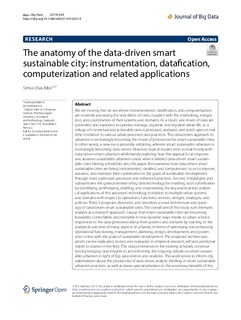| dc.description.abstract | We are moving into an era where instrumentation, datafication, and computerization are routinely pervading the very fabric of cities, coupled with the interlinking, integration, and coordination of their systems and domains. As a result, vast troves of data are generated and exploited to operate, manage, organize, and regulate urban life, or a deluge of contextual and actionable data is produced, analyzed, and acted upon in real time in relation to various urban processes and practices. This data-driven approach to urbanism is increasingly becoming the mode of production for smart sustainable cities. In other words, a new era is presently unfolding wherein smart sustainable urbanism is increasingly becoming data-driven. However, topical studies tend to deal mostly with data-driven smart urbanism while barely exploring how this approach can improve and advance sustainable urbanism under what is labeled ‘data-driven smart sustainable cities.’ Having a threefold aim, this paper first examines how data-driven smart sustainable cities are being instrumented, datafied, and computerized so as to improve, advance, and maintain their contribution to the goals of sustainable development through more optimized processes and enhanced practices. Second, it highlights and substantiates the great potential of big data technology for enabling such contribution by identifying, synthesizing, distilling, and enumerating the key practical and analytical applications of this advanced technology in relation to multiple urban systems and domains with respect to operations, functions, services, designs, strategies, and policies. Third, it proposes, illustrates, and describes a novel architecture and typology of data-driven smart sustainable cities. The overall aim of this study suits thematic analysis as a research approach. I argue that smart sustainable cities are becoming knowable, controllable, and tractable in new dynamic ways thanks to urban science, responsive to the data generated about their systems and domains by reacting to the analytical outcome of many aspects of urbanity in terms of optimizing and enhancing operational functioning, management, planning, design, development, and governance in line with the goals of sustainable development. The proposed architecture, which can be replicated, tested, and evaluated in empirical research, will add additional depth to studies in the field. This study intervenes in the existing scholarly conversation by bringing new insights to and informing the ongoing debate on smart sustainable urbanism in light of big data science and analytics. This work serves to inform city stakeholders about the pivotal role of data-driven analytic thinking in smart sustainable urbanism practices, as well as draws special attention to the enormous benefits of the emerging paradigm of big data computing as to transforming the future form of such urbanism. | nb_NO |
| dc.description.localcode | © The Author(s) 2019. This article is distributed under the terms of the Creative Commons Attribution 4.0 International License (http://creativecommons.org/licenses/by/4.0/), which permits unrestricted use, distribution, and reproduction in any medium, provided you give appropriate credit to the original author(s) and the source, provide a link to the Creative Commons license, and indicate if changes were made. | nb_NO |

